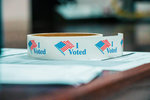




Lewis County Chief Deputy Auditor Tom Stanton came to his office Thursday to find approximately 60 emails in his inbox, all asking the same question: Are ballot drop boxes for the upcoming election on Nov. 3 really secured with just a zip tie?
Stanton spent his day responding and assuring people that of course ballot drop boxes are not secured by a simple zip tie. The red zip ties visible on a ballot drop boxes are a way for election staff to see which staffer accessed the box last, while an “internal, double deadbolt” is used to keep all of the ballots inside safe from being tampered with.
“It’s a panel lock, so there’s kind of a little circle and the key pops in and then it activates the mechanism inside the box, so it is more secure then having a padlock that someone could just cut,” Stanton said of the security of the drop boxes.
So, in fact, the red zip ties are an extra measure of security, not a disregard for security.
However, ballot boxes being secured by zip ties isn’t the only misconception or just flat out myth that Stanton has had to dispel in recent weeks, and he along with Elections Supervisor Heather Boyer have been working to address them all.
“We want everything to go smoothly and we want
everyone to trust the election,” Stanton said.
Misinformation about ballots and the election are common during presidential election years, Stanton said, but the two have noticed a slight uptick in the myths that get passed around on Facebook — a usual suspect when it comes to spreading false information.
For example, Stanton has had to correct people in the past regarding the use of zip ties as a security measure in elections from the past few years, but he has never seen the amount of people concerned about it as he has in 2020.
And now that more Lewis County residents are turning out earlier than ever to vote, the two felt it was important that voters feel secure about their ballots.
As of Friday, about 15 percent of Lewis County voters have already turned in ballots, about a nine point increase from the 2016 presidential election, Boyer said.
Another prevalent misconception Boyer has noticed deals with the ‘secrecy’ envelope that Washington voters are encouraged to put their ballot in before they put it in the mailing envelope.
“Right now the big thing is Pennsylvania with the naked ballot — if you don’t put your ballot in a secrecy envelope it won’t count — that’s not true in Washington state,” Boyer said.
Indeed, Pennsylvania’s Supreme Court ruled that in order for a mail-in ballot to be counted, it needs to be placed in the “secrecy” envelope first.
Boyer suspects that someone on Facebook saw an article about the Pennsylvania law and erroneously applied it to Washington state.
But in Washington, your ballot will still be counted even if you forget to put it in the secrecy envelope before you put it in the mail, though it is encouraged.
What voters should be conscious of, Boyer said, is to sign and date the mailing envelope the ballot gets placed inside.
An inaccurate or missing signature and date will result in a “challenged ballot,” but it doesn’t mean your ballot will just get tossed out.
“What would happen is if you didn’t sign your declaration envelope, or the signature didn’t match what we have on file, we notify you by letter,” Boyer said. “If you don’t respond to that letter, we also follow up with a phone call and give you an opportunity to resolve that.”
If the voter does not reply to either of the two inquiries from the Auditor’s Office, the ballot will be sent to the Lewis County Canvassing Board, who double checks the ballot and determines what will be done with it.
“They are the ones who would ultimately reject the ballot,” Boyer said.
Though they are few and far between, there are legitimate mistakes that get made when ballots get sent out.
For example, Donna Shaw, a Napavine resident, contacted The Chronicle after receiving two ballots bearing the name of her late husband and her son, who share the same name. One of the ballots was addressed to “Thomas Franklin Shaw” while the other was to “Tom Shaw.”
She was unsure if her son had mistakenly received a duplicate ballot, or her husband who has been dead for 20 years mistakenly received a ballot.
Deputy Auditor Terry Jouper said it was much more likely that Shaw’s son had received a duplicate ballot rather than her late husband.
“That does happen occasionally, in our system it will match (people) to their name, birth date, drivers license number,” Joupur said. “So if their name is significantly different and they don’t have a drive’rs license number on hold (in our system), it may not catch them.”
“That does happen once and awhile, but it is not a widespread issue,” Joupur added.
And even in a scenario where a person turned in two ballots, Stanton said their system would pick that up immediately and the person responsible would have been contacted about the mistake.
“Washington participates in ERIC, which is the Electronic Registration Information Center, and there’s now 30 states and D.C. that are apart of that, and so they compare voter registration lists against each other and then they also bring in the Social Security Deceased Index,” to monitor if voters have died, Stanton said.
The Auditor’s Office even goes through The Chronicle’s obituaries to keep their voter registration list up to date.
The best thing a person can do if they find themselves in a similar position as Shaw, however unlikely that may be, is to call the Auditor’s Office at 360-740-1165.